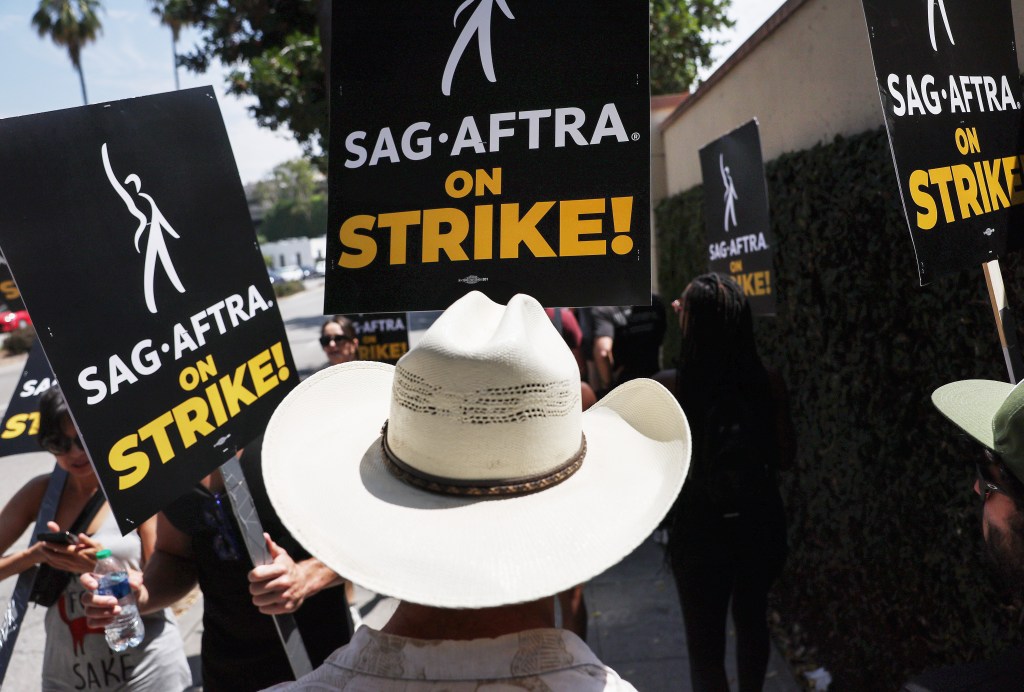YouTube Music contract workers went on strike on Wednesday morning because of Google’s refusal to bargain with the union representing the workers. Google, YouTube’s parent company, claims that because the workers are employed through a third-party contractor it has no obligation to meet them at the table, according to an email from a law firm representing Google seen by Motherboard.
These workers are contracted by Cognizant, one of the many subcontractors which works with Google and its parent company Alphabet. They’re responsible for “ensuring music content is available and approved for YouTube Music’s 80 million subscribers worldwide,” according to a press release from April, when they first voted to join the Alphabet Workers Union (AWU-CWA). The union as a whole is not yet federally recognized, as it has not achieved a majority status in the company, but the NLRB has recognized YouTube Music workers.
Videos by VICE
However, Google has refused to bargain with them, because it says it is not legally considered to be their employer. The workers, the union, and the National Labor Relations Board (NLRB) contest this point.
“We have a one day strike that we’re undertaking due to Google’s continued refusal to even acknowledge us as their employees,” said Katie Marschner, a YouTube Music contract worker since 2021, in a phone call with Motherboard. “They said, ‘We will not participate in collective bargaining in connection with this unit,’ which is super illegal and disrespectful.”
A Google spokesperson told Motherboard in a statement at the time of the unionization that it had “no objection to these Cognizant workers electing to form a union,” but that it would not bargain with them. “We are not a joint employer as we simply do not control their employment terms or working conditions—this matter is between the workers and their employer, Cognizant,” the spokesperson said.
The NLRB, however, upheld on two occasions that Google and Cognizant were joint employers of the YouTube Music workers, and that therefore both companies were obligated to bargain a contract with them. Google said it would appeal the decision.
After the first Board decision, the union wrote a letter to Google demanding that it come to the table. Motherboard obtained a copy of the letter Google wrote in response.
“I write on behalf of Google in response to your July 26, 2023 letter reiterating AWU Local 9009’s demand to bargain with both Cognizant and Google,” the letter, which was written by an attorney at the law firm Jones Day, begins. “As I indicated in my previous letter, Google does not employ any of the Cognizant employees in the bargaining unit you represent, does not control any of the essential terms and conditions of their employment, and therefore could not meaningfully contribute to collective bargaining.”
“The NLRB’s decision is flawed in numerous respects and, in our view, should not survive appellate review. For these reasons, Google will not be participating in collective bargaining in connection with this unit,” it continues. “We continue to encourage the AWU to prioritize the interests of the individuals you represent by engaging their actual employer (Cognizant) in bargaining, rather than subjecting your members to additional delays in pursuit of a legal theory that is neither supported by the facts or a proper application of the governing legal standard.”

“As we’ve said before, we have no objection to these Cognizant employees electing to form a union,” Google spokesperson Courtenay Mencini told Motherboard in an emailed statement. “We simply believe it’s only appropriate for Cognizant, as their employer, to engage in collective bargaining. We still disagree with the NLRB’s decision, which deviated from the governing standard, ignored precedent, and applied a faulty analysis. Google does not control the employment terms or conditions of these Cognizant workers, and we’ll continue to assert our position that we’re not a joint employer.” Mencini said the workers’ strike would not affect the company’s work with Cognizant.
According to the union, Cognizant has also refused to bargain, citing Google’s appeals as the reason for its delay.
“Google refuses to just admit that they are our employer, and then Cognizant is just using Google’s legal appeals as a scapegoat,” Marschner said. “That, honestly, is exactly why we filed for joint employer status in the first place. We knew that if we just tried to engage in collective bargaining with Cognizant, that’s exactly what they would do.”
The letter from Google is dated August 3, 2023. On Tuesday, the union filed an unfair labor practice charge to the NLRB, stating that on that date, “Cognizant and Google, as joint employers, refused to bargain in good faith with the union certified to represent the YouTube Music employees.”
“It’s kind of unfathomable, the challenge that we’re up against,” Marschner said. “We’re fighting against two Fortune 500 companies. I think it’s quite clear that they are hoping that they can stall and delay until the next presidential election, and then hopefully Republicans will take over and the NLRB will change and be less favorable to unions and workers.”
A Cognizant spokesperson told Motherboard in an email, “We have received the Alphabet Workers Union’s request for a Cognizant bargaining representative. The request put forward was for both Cognizant and Google to bargain. While we respect our associates’ rights to unionize, we firmly believe Cognizant is the sole employer of our associates. While the joint employer ruling remains unresolved, we cannot bargain at this time.”
“There will be many opportunities to file unfair labor practice charges, but I think outside of that, we’re going to have to have other means of putting pressure on them,” Marschner said. “It’s going to take a lot of really smart organizing. I believe we’re up for the challenge, but I wish it wasn’t this way.”
Update: This story has been updated with comment from Cognizant.




